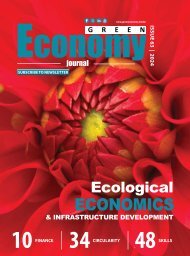Green Economy Journal Issue 61
Create successful ePaper yourself
Turn your PDF publications into a flip-book with our unique Google optimized e-Paper software.
WASTE<br />
Responsible<br />
ACTIONS TODAY<br />
will<br />
Solar panel<br />
and battery waste<br />
SAFEGUARD<br />
TOMORROW<br />
Looking back, 2023 will undoubtedly go down in history as the year that South Africa’s<br />
corporate and civil society went solar in a way never seen before. To avoid the crippling effect<br />
of loadshedding, hundreds of thousands of individuals and companies recently opted to invest<br />
in solar panels.<br />
According to a recent BusinessTech report, South Africa’s imports<br />
of solar panels increased thrice from the previous quarter to<br />
an all-time high of R3.6-billion in the first quarter of 2023.<br />
“While this is good news for renewable energy, we also need to<br />
think about the long-term implications that even this ‘green energy’<br />
will have on the environment,” cautions Dr Mark Williams-Wynn, KZN<br />
branch committee member of the Institute of Waste Management of<br />
Southern Africa (IWMSA). “In the coming years, we will have to deal<br />
with the recycling of millions of solar panels and batteries that are<br />
currently being imported into South Africa.”<br />
The challenge: millions of discarded panels and batteries<br />
Williams-Wynn says there’s now an estimate of between 20-million<br />
and 25-million solar panels in the country after the recent influx.<br />
Most have an expected lifespan of about 20 years and according to<br />
Williams-Wynn, South Africa should be ready for mass recycling in<br />
about 10 to 15 years’ time. “That is when we will see thousands of<br />
52<br />
panels having to be replaced with new ones, and when recycling the<br />
old products correctly will become critically important.”<br />
He explains that one of the challenges with solar panel waste is that<br />
they are banned from landfills, as they are potentially hazardous to<br />
both human and environmental health. “We need to adopt alternative<br />
waste management solutions, such as recycling, refurbishing and<br />
repairing, or reusing them in lower-demand applications,” he continues,<br />
adding that emphasis needs to be placed on the waste management<br />
of the batteries used in solar systems as well.<br />
“I believe this to be the bigger challenge,” Williams-Wynn warns.<br />
“The batteries in household solar panels are lithium iron phosphate<br />
batteries, also known as lithium ferrophosphate (LFP) batteries. The<br />
only material in this battery that has some value when recovered is<br />
lithium. The iron and phosphate is of such low value that it’s not really<br />
economically viable to try and recover them.”<br />
Furthermore, the product is highly flammable. “And once that fire<br />
starts, it is self-sustaining,” he warns. “They don’t need oxygen to<br />
burn, and even when smothering burning batteries with foam they<br />
can continue to burn.”<br />
The solution: adherence and power of the customer’s voice<br />
The success or failure of South Africa’s solar waste story will depend<br />
on how responsibly we operate in the here and now, Williams-<br />
Wynn notes.<br />
“The methods for properly disposing of and recycling panels and<br />
batteries are constantly developing and improving – but if we do<br />
nothing now, we could face a catastrophe later.<br />
There is simply not enough adherence to the Extended Producer<br />
Responsibility (EPR) regulations which took effect in 2021 and hold<br />
producers (which includes manufacturers, importers, distributors and<br />
retailers) accountable for the end-of-life management of their products,”<br />
he says. “There are many reasons for this, including expenses, control<br />
READ REPORT<br />
A CALL TO ACTION<br />
The rapid worldwide adoption of technology has undeniably delivered<br />
various advantages. However, it has also ushered in a troubling<br />
increase in the unlawful disposal of electronic waste (e-waste).<br />
This trend not only inflicts damage upon the environment but also<br />
exposes communities to serious health hazards.<br />
The producer responsibility organisation (PRO) Circular Energy is<br />
taking a strong stance against this growing issue and is calling on<br />
government, industries and consumers to collaborate in eradicating<br />
illegal e-waste dumping.<br />
Consumer behaviour crucial<br />
E-wasted, is a complex issue, exacerbated by the hazardous components<br />
within these items. Improper disposal techniques used in illegal<br />
e-waste dumping frequently have negative effects on the environment<br />
and human health.<br />
Patricia Schröder, spokesperson for Circular Energy emphasises<br />
that illegal e-waste dumping has far-reaching implications. “It poses<br />
a threat to the health of communities that are already susceptible.<br />
It also contaminates soil, water and air. To deal with this threat, fast<br />
action is required. For instance, government and businesses can<br />
work together to close regulatory gaps and impose severe fines on<br />
those responsible for illicit e-waste dumping. This will send a clear<br />
message that these actions will not be tolerated.”<br />
THOUGHT [ECO]NOMY<br />
greeneconomy/report recycle<br />
WASTE<br />
One of the challenges with solar panel waste<br />
is that they are banned from landfills.<br />
NATIONAL WASTE MANAGEMENT STRATEGY | Department of Forestry, Fisheries and the<br />
Environment | [2020]<br />
and enforcement, but in the end, the environment suffers – and it will<br />
be everyone’s problem in future.”<br />
According to Williams-Wynn, both the public and solar installers<br />
can change things.<br />
“Customers often don’t realise the collective power that they have.<br />
To ensure that our solar and battery producers are complying with the<br />
EPR regulations, we must all exert pressure on them. If that happens,<br />
South Africa will be equipped and ready when the solar waste wave<br />
strikes in a few years.”<br />
According to Schröder, consumer behaviour also plays a pivotal<br />
role in combating the issue. “Our choices as consumers hold immense<br />
power. By disposing of our electrical and electronic products<br />
responsibly, we can create a shift towards responsible recycling and<br />
discourage illegal dumping.”<br />
Proper disposal<br />
To facilitate responsible disposal, Circular Energy has partnered with<br />
Woolworths to establish drop-off points across the country (a list of<br />
which can be viewed here).<br />
“This initiative aims to make it easier for consumers to dispose of<br />
these items properly,” Schröder explains. “By utilising these drop-off<br />
points, consumers can contribute to responsible waste management<br />
and help prevent the escalation of illegal e-waste dumping.” To<br />
make matters even easier, consumers can also request collection<br />
through Circular Energy’s website, ensuring that responsible disposal<br />
is within everyone’s reach.<br />
“This service empowers consumers to be part of the solution<br />
without compromising convenience,” she concludes. “For instance,<br />
we recently received a call from a concerned citizen, informing us<br />
of illegally dumped fluorescent tubes in a roadside rubbish bin in<br />
Gauteng. Our team responded swiftly to remove these tubes and<br />
recycled them in a responsible manner.”<br />
How a country manages its waste is a fundamental indicator of the extent to which that society is<br />
functional and being managed in a sustainable manner, and the implementation of this strategy must<br />
have a positive impact on the lives of all South Africans through shared socio-economic development.<br />
The National Waste Management Strategy (NWMS) provides government policy and strategic<br />
interventions for the waste sector and is aligned and responsive to the Sustainable Development Goals<br />
(SDGs) of Agenda 2030 adopted by all United Nations member states. It is also aligned and responsive<br />
to South Africa’s National Development Plan: Vision 2030 which is our country’s specific response to,<br />
and integration of the SDGs into our overall socio-economic development plans.<br />
The 2020 strategy has the concept of the circular economy at its centre. The circular economy is<br />
an approach to minimising the environmental impact of economic activity by reusing and recycling<br />
processed materials to minimise: (a) the need to extract raw materials from the environment; and (b)<br />
the need to dispose of waste.<br />
The circular economy is built on innovation and the adoption of new approaches and techniques<br />
in product design, production, packaging and use – industrial symbiosis, for instance, is a way of<br />
preventing waste in industrial production by redirecting waste from one production process to serve<br />
as raw materials for another production process.<br />
The strategy comes at a time when there is growing knowledge and awareness of the environmental<br />
consequences of human activity in relation to the climate and environmental pollution. The widespread<br />
impact of plastic packaging on our coasts, rivers and wetlands is a cause for great concern. – Minister<br />
Barbara Creecy, Minister of Forestry, Fisheries and the Environment<br />
53

















